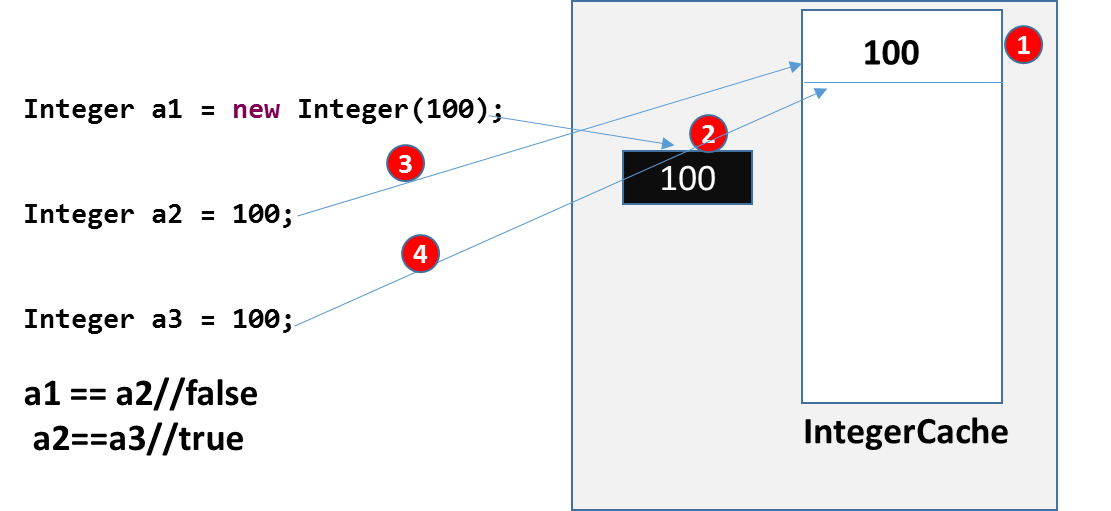Wrapper classes
Collections in Java deal only with objects; to store a primitive type values in one of these Collection classes, you need to Convert the primitive type to Object Type.
The main objectives of wrapper classes are:
-
To Wrap primitives into object form. So that we can handle primitives also just like objects.
-
To Define several utility functions for the primitives (converting primitive to the string form etc)
Each primitive type has a corresponding wrapper class.
| Primitive Type | Wrapper Class |
|---|---|
| double | Double |
| float | Float |
| long | Long |
| int | Integer |
| short | Short |
| byte | Byte |
| char | Character |
| boolean | Boolean |
Primitive type to wrapper class
1.using constructors
// 1. using constructor
Integer object = new Integer(10);
2.using static factory methods such as valueOf() (except Character)
// 2. using static factory method
Integer anotherObject = Integer.valueOf(10);
Similarly, we can convert other primitive types like boolean to Boolean, char to Character, etc.
Wrapper class to primitive type
Converting from wrapper to primitive type is simple. We can use the corresponding methods to get the primitive type. e.g. intValue(), doubleValue(), shortValue() etc.
Integer object = new Integer(10);
int val = object.intValue(); //wrapper to primitive
Autoboxing and Unboxing
Beginning with JDK 5, Java added two important features: autoboxing and auto-unboxing.
Autoboxing is the automatic conversion of the primitive types into their corresponding object wrapper classes. For example, converting an int to an Integer, a char to a Character, and so on.
We can simply pass or assign a primitive type to an argument or reference accepting wrapper class object. e.g.
List<Integer> integerList = new ArrayList<>();
for (int i = 1; i < 50; i += 2)
{
integerList.add(Integer.valueOf(i)); //autoboxing
}
Unboxing happens when the conversion happens from wrapper class to its corresponding primitive type. It means we can pass or assign a wrapper object to an argument or reference accepting primitive type. e.g.
public static int sumOfEven(List<Integer> integerList)
{
int sum = 0;
for (Integer i: integerList) {
if (i % 2 == 0)
sum += i; //Integer to int
}
return sum;
}
In above example, the remainder (%) and unary plus (+=) operators does not apply on Integer objects. The compiler automatically converts an Integer to an int at runtime by invoking the intValue()method.
Integer i = 10;// it will create Integer value of 10 using Autoboxing
int j = i;// ;// it will convert Integer to int using Autoboxing
Wrapper Classes Internal Caching
Wrapper classes are immutable in java, Right? -YES”. So, like string pool, they can also have their pool, right? -Great Idea”. Well, it’s already there. JDK provided wrapper classes also provide this in form of instance pooling i.e. each wrapper class store a list of commonly used instances of own type in form of cache and whenever required, you can use them in your code. It helps in saving lots of byes in your program runtime.
In Integer.java class, there is an inner class i.e. IntegerCache. When you assign a new int to Integer type like below
Integer i = 10; //OR
Integer i = Integer.valueOf(10);
An already created Integer instance is returned and reference is stored in i. Please note that if you use new Integer(10); then a new instance of Integer class will be created and caching will not come into picture. Its only available when you use Integer.valueOf() OR directly primitive assignment (which ultimately uses valueOf() function)
public class IntegerCacheDemo {
public static void main(String[] args) {
Integer a1 = new Integer(100);
Integer a2 = 100;
Integer a3 = 100;
System.out.println(a1 == a2);
System.out.println(a2 == a3);
}
}
Output:
false
false

If you want to store a bigger number of instances, you can use runtime parameter as below:
-Djava.lang.Integer.IntegerCache.high=2000